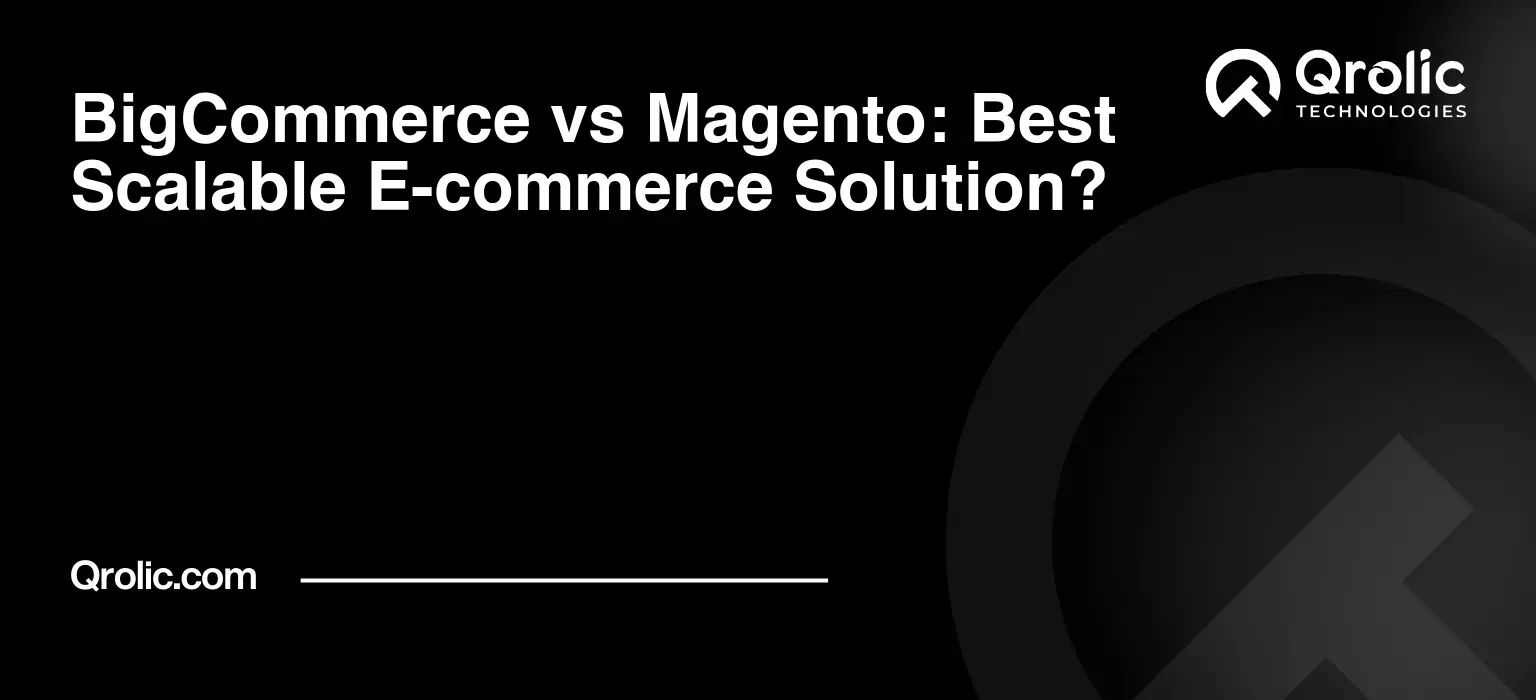Choosing the right e-commerce platform is a monumental decision, especially when your sights are set on growth. You need a platform that can handle increasing traffic, expanding product catalogs, and complex operational needs. In this arena, BigCommerce and Magento consistently emerge as frontrunners. But which one truly reigns supreme as the best scalable e-commerce solution?
This comprehensive guide dives deep into the core features, functionalities, and nuances of both BigCommerce and Magento, equipping you with the knowledge to make an informed decision for your business’s future. We’ll explore everything from ease of use to pricing structures, SEO capabilities to security features, and much more. Get ready to embark on a journey to discover the platform that will empower your e-commerce empire to thrive.
Table of Contents
- What is Scalability and Why Does it Matter in E-commerce?
- BigCommerce: The Scalable SaaS Solution
- Key Features and Benefits of BigCommerce
- BigCommerce Pricing and Plans
- BigCommerce SEO Capabilities
- BigCommerce: Who is it Best For?
- Magento (Adobe Commerce): The Customizable Open-Source Powerhouse
- Key Features and Benefits of Magento (Adobe Commerce)
- Magento (Adobe Commerce) Pricing and Plans
- Magento (Adobe Commerce) SEO Capabilities
- Magento (Adobe Commerce): Who is it Best For?
- BigCommerce vs. Magento: A Detailed Comparison
- Key Decision Factors: Making the Right Choice for Your Business
- Real-World Examples: BigCommerce and Magento in Action
- Migration Considerations: Switching Platforms
- Expert Advice: Maximizing Your E-commerce Potential
- Qrolic Technologies: Your Partner in E-commerce Success
- Conclusion: Choosing the Right Path for Your E-commerce Journey
What is Scalability and Why Does it Matter in E-commerce?
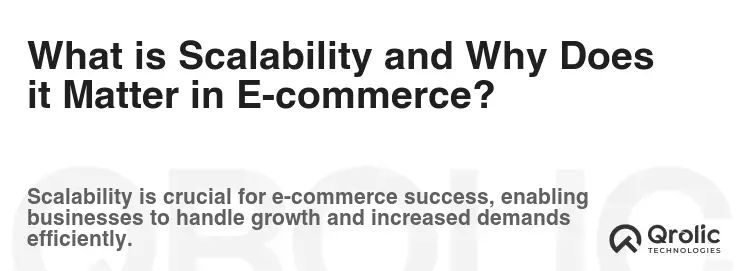
Before we delve into the specifics of BigCommerce vs. Magento, let’s define scalability and its critical importance in the context of e-commerce.
Scalability, in simple terms, is the ability of a system (in this case, your e-commerce platform) to handle an increasing workload. This workload can manifest in various forms:
- Increased Traffic: More visitors browsing your online store.
- Expanding Product Catalog: Adding new products and categories.
- Higher Order Volume: Processing more transactions.
- Growing User Base: Managing more customer accounts.
- Integration Complexity: Connecting with more third-party apps and services.
A scalable e-commerce platform allows you to accommodate these growing demands without experiencing performance bottlenecks, system crashes, or a degraded customer experience.
Why is Scalability Crucial?
- Sustained Growth: Prevents your platform from becoming a roadblock to your business expansion.
- Enhanced Customer Experience: Ensures fast loading times, smooth navigation, and reliable order processing, even during peak seasons.
- Reduced Downtime: Minimizes the risk of system failures due to overload, preserving your sales and reputation.
- Improved Efficiency: Streamlines operations and allows your team to focus on growth initiatives rather than firefighting technical issues.
- Cost-Effectiveness: Scalable platforms often offer flexible pricing plans that adapt to your needs, avoiding unnecessary expenses.
Choosing a platform that isn’t scalable can be a costly mistake in the long run. You might find yourself needing to migrate to a new platform sooner than expected, resulting in significant disruption and expense.
BigCommerce: The Scalable SaaS Solution
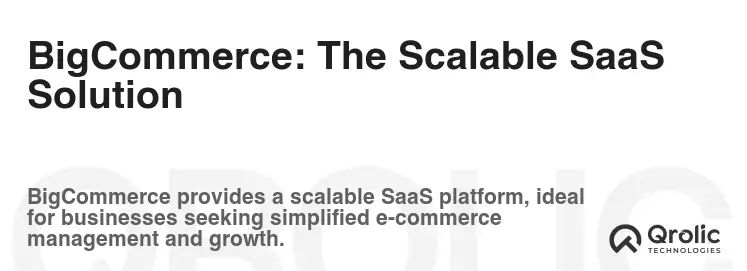
BigCommerce is a leading Software-as-a-Service (SaaS) e-commerce platform. This means that BigCommerce hosts the platform, handles the technical infrastructure, and provides software updates, allowing you to focus solely on managing your business and selling products. It’s a popular choice for businesses of all sizes, from startups to established enterprises, looking for a user-friendly and scalable solution.
Key Features and Benefits of BigCommerce
- Ease of Use: BigCommerce is known for its intuitive interface, making it relatively easy to set up and manage your online store, even with limited technical expertise.
- Built-in Features: Offers a wide range of built-in features, including SEO tools, marketing integrations, payment gateways, and shipping options, reducing the need for third-party apps.
- Scalability: Designed for scalability, capable of handling high traffic volumes and large product catalogs without significant performance issues.
- Security: Provides robust security features, including PCI DSS compliance and DDoS protection, ensuring the safety of your customer data.
- 24/7 Support: Offers round-the-clock customer support, providing assistance whenever you need it.
- Headless Commerce Capabilities: Supports headless commerce, allowing you to decouple the front-end from the back-end, enabling greater flexibility in creating custom shopping experiences.
- Multi-Channel Selling: Integrates with popular marketplaces like Amazon and eBay, allowing you to sell your products across multiple channels.
- App Marketplace: Offers a wide selection of apps and integrations to extend the platform’s functionality.
BigCommerce Pricing and Plans
BigCommerce offers a tiered pricing structure based on your annual online sales:
- Standard: Suitable for startups and small businesses with up to $50k in online sales per year.
- Plus: Designed for growing businesses with up to $180k in online sales per year.
- Pro: Ideal for established businesses with up to $400k in online sales per year.
- Enterprise: Tailored for high-volume businesses with complex needs and exceeding $400k in online sales.
Each plan includes a specific set of features and benefits. As you move up to higher plans, you unlock more advanced features and higher sales thresholds. Overages can apply if you exceed your sales limit within a given year. The Enterprise plan is customized for specific business needs, so pricing varies.
BigCommerce SEO Capabilities
BigCommerce is generally considered to be strong in SEO. Here are some of its key SEO features:
- Customizable URLs: Allows you to create SEO-friendly URLs for your product pages and categories.
- Meta Descriptions and Title Tags: Enables you to optimize meta descriptions and title tags for each page.
- Image Optimization: Supports image optimization, including alt text and file compression.
- Mobile-Friendly Design: Offers responsive themes that are optimized for mobile devices.
- Built-in Blog: Includes a built-in blog feature for content marketing.
- Schema Markup: Allows you to add schema markup to your product pages to improve search engine visibility.
- 301 Redirects: Makes it easy to implement 301 redirects when you change URLs.
- SSL Certificate: Provides an SSL certificate to secure your website.
BigCommerce: Who is it Best For?
BigCommerce is particularly well-suited for:
- Businesses looking for a user-friendly and hassle-free e-commerce solution.
- Businesses that need a scalable platform that can handle high traffic and large product catalogs.
- Businesses that want to focus on selling products rather than managing technical infrastructure.
- Businesses that value built-in features and integrations.
- Businesses that need 24/7 customer support.
Magento (Adobe Commerce): The Customizable Open-Source Powerhouse
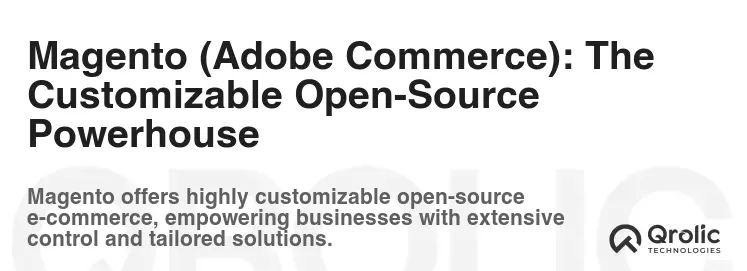
Magento (now known as Adobe Commerce since being acquired by Adobe) is a powerful open-source e-commerce platform. This means that you have complete control over the platform’s code and can customize it to meet your specific needs. While it offers unparalleled flexibility, it also requires more technical expertise to set up and manage.
Key Features and Benefits of Magento (Adobe Commerce)
- Customizability: Offers unparalleled customizability, allowing you to tailor the platform to your exact requirements.
- Scalability: Highly scalable, capable of handling the most demanding e-commerce operations.
- Extensibility: Boasts a vast ecosystem of extensions and integrations, allowing you to add virtually any functionality you need.
- Multi-Store Management: Enables you to manage multiple online stores from a single platform.
- Advanced SEO Features: Provides a wide range of advanced SEO features, giving you granular control over your search engine optimization strategy.
- Security: Offers robust security features, including PCI DSS compliance and advanced fraud protection.
- Community Support: Benefits from a large and active community of developers and users.
Magento (Adobe Commerce) Pricing and Plans
Magento (Adobe Commerce) offers two main versions:
- Magento Open Source (Free): A free, open-source version that you can download and install on your own server. While the software is free, you’ll need to pay for hosting, development, and maintenance.
- Adobe Commerce (Paid): A fully managed, enterprise-level version with advanced features and support. Pricing is based on your annual gross revenue and is typically in the tens of thousands of dollars per year.
The cost of Magento can vary significantly depending on your specific needs and the level of customization you require. Factor in hosting costs, development costs, extension costs, and maintenance costs when budgeting for Magento.
Magento (Adobe Commerce) SEO Capabilities
Magento is an SEO powerhouse, offering a wide array of features and capabilities to optimize your online store for search engines:
- Customizable URLs: Allows you to create highly optimized URLs for your product pages, categories, and content pages.
- Meta Descriptions and Title Tags: Provides granular control over meta descriptions and title tags for all pages.
- Canonical URLs: Helps prevent duplicate content issues by specifying the preferred version of a page.
- Image Optimization: Supports image optimization, including alt text and file compression.
- Mobile-Friendly Design: Offers responsive themes that are optimized for mobile devices.
- Schema Markup: Makes it easy to implement schema markup to enhance search engine visibility.
- XML Sitemap Generation: Automatically generates XML sitemaps to help search engines crawl your website.
- Robots.txt Management: Allows you to control which pages are crawled by search engines.
- URL Rewrites: Enables you to create custom URLs for improved SEO and user experience.
Magento (Adobe Commerce): Who is it Best For?
Magento (Adobe Commerce) is best suited for:
- Businesses that require a highly customizable and scalable e-commerce solution.
- Businesses with complex needs and unique requirements.
- Businesses that have the technical expertise or are willing to invest in development and maintenance.
- Businesses that need advanced SEO features and control.
- Businesses that need to manage multiple online stores from a single platform.
- Enterprise-level businesses with significant revenue and complex operational needs.
BigCommerce vs. Magento: A Detailed Comparison
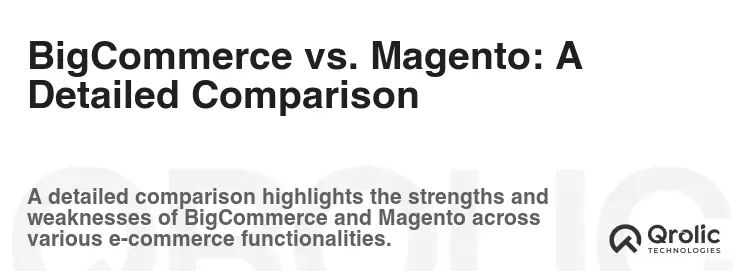
Now that we’ve examined each platform individually, let’s compare them side-by-side across key areas:
1. Ease of Use:
- BigCommerce: Winner. BigCommerce’s user-friendly interface and drag-and-drop functionality make it easier to set up and manage your online store.
- Magento (Adobe Commerce): Requires more technical expertise. Setting up and customizing Magento can be complex and may require the assistance of a developer.
2. Scalability:
- BigCommerce: Highly scalable and can handle significant traffic and product catalogs. The SaaS architecture ensures scalability is managed by BigCommerce.
- Magento (Adobe Commerce): Extremely scalable and can handle the most demanding e-commerce operations. However, scalability relies heavily on proper server configuration and optimization.
3. Customization:
- BigCommerce: Offers decent customization options through themes and apps, but is limited compared to Magento.
- Magento (Adobe Commerce): Winner. Provides unparalleled customization options, allowing you to tailor the platform to your exact requirements.
4. Pricing:
- BigCommerce: More predictable pricing with tiered plans based on annual sales.
- Magento (Adobe Commerce): Can be more expensive, especially when factoring in hosting, development, and maintenance costs. Magento Open Source is free to download, but the total cost of ownership can be higher than BigCommerce. Adobe Commerce (the paid version) is significantly more expensive.
5. SEO:
- BigCommerce: Offers a solid set of built-in SEO features.
- Magento (Adobe Commerce): Winner. Provides a wider range of advanced SEO features and greater control over optimization.
6. Security:
- BigCommerce: Offers robust security features and handles security updates.
- Magento (Adobe Commerce): Requires you to manage your own security updates and patches for the open-source version. Adobe Commerce (paid version) provides managed security.
7. Support:
- BigCommerce: Offers 24/7 customer support.
- Magento (Adobe Commerce): Relies on community support for the open-source version. Adobe Commerce (paid version) provides dedicated support.
8. App Marketplace:
- BigCommerce: Offers a decent selection of apps and integrations.
- Magento (Adobe Commerce): Boasts a vast ecosystem of extensions and integrations.
9. Target Audience:
- BigCommerce: Best for businesses of all sizes looking for a user-friendly and scalable solution.
- Magento (Adobe Commerce): Best for businesses with complex needs, high customization requirements, and the technical expertise or budget to support it.
Here’s a table summarizing the key differences:
| Feature | BigCommerce | Magento (Adobe Commerce) |
|---|---|---|
| Ease of Use | High | Low (Requires Technical Expertise) |
| Scalability | High | Extremely High |
| Customization | Moderate | Extremely High |
| Pricing | Predictable, Tiered Plans | Variable, Can Be Expensive |
| SEO | Good | Excellent |
| Security | Managed by BigCommerce | Requires Self-Management (Open Source) |
| Support | 24/7 Customer Support | Community (Open Source), Dedicated (Paid) |
| App Marketplace | Decent | Vast |
Key Decision Factors: Making the Right Choice for Your Business
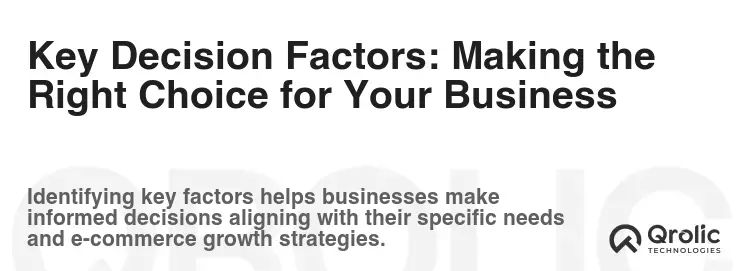
Ultimately, the best online store solution for your business depends on your specific needs, budget, and technical capabilities. Here are some key factors to consider:
- Budget: How much are you willing to spend on your e-commerce platform? Consider not only the platform fees but also hosting, development, and maintenance costs.
- Technical Expertise: Do you have the technical expertise in-house to set up and manage a complex platform like Magento? If not, are you willing to hire a developer?
- Customization Needs: How much customization do you require? If you need a highly customized solution, Magento may be the better choice.
- Scalability Requirements: How much traffic and product volume do you anticipate in the future? Both platforms are scalable, but Magento offers more flexibility for handling extreme growth.
- Time to Market: How quickly do you need to launch your online store? BigCommerce’s ease of use can help you get up and running faster.
Real-World Examples: BigCommerce and Magento in Action
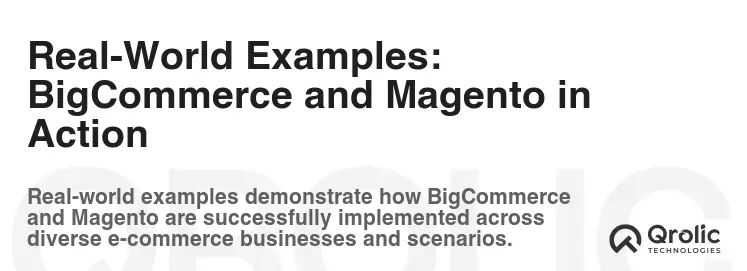
To further illustrate the strengths of each platform, let’s look at some real-world examples:
BigCommerce Success Story:
- Skullcandy: This popular headphone brand chose BigCommerce for its scalability, ease of use, and built-in features. BigCommerce allowed Skullcandy to manage its growing online store efficiently and provide a seamless customer experience.
Magento (Adobe Commerce) Success Story:
- Land Rover: This luxury automotive brand uses Adobe Commerce (Magento) to create a highly customized and engaging online experience for its customers. The platform’s flexibility allows Land Rover to showcase its vehicles in an innovative and interactive way.
These examples demonstrate that both BigCommerce and Magento can be successful for different types of businesses. The key is to choose the platform that aligns best with your specific needs and goals.
Migration Considerations: Switching Platforms
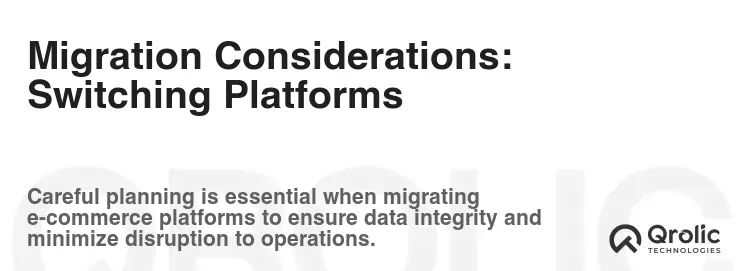
If you’re already using an e-commerce platform and considering migrating to BigCommerce or Magento, here are some important considerations:
- Data Migration: How will you migrate your product data, customer data, and order history to the new platform?
- SEO Impact: How will the migration affect your search engine rankings? Implement 301 redirects to minimize any negative impact.
- Website Design: Will you need to redesign your website to fit the new platform?
- Integration with Existing Systems: How will the new platform integrate with your existing accounting, CRM, and other systems?
- Downtime: How much downtime will you experience during the migration? Plan the migration carefully to minimize disruption.
Migrating to a new e-commerce platform can be a complex process. Consider working with an experienced e-commerce agency to ensure a smooth and successful transition.
Expert Advice: Maximizing Your E-commerce Potential
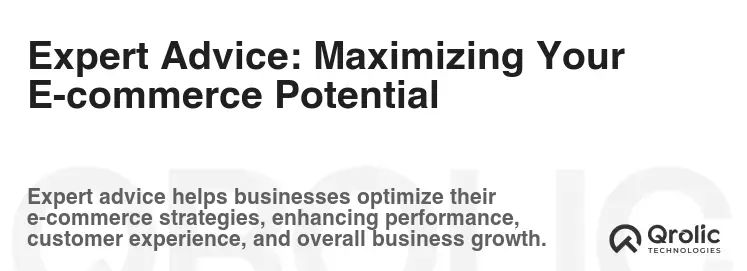
Whether you choose BigCommerce or Magento, here are some expert tips to maximize your e-commerce potential:
- Focus on Customer Experience: Create a user-friendly website with clear navigation, high-quality product images, and detailed descriptions.
- Optimize for Mobile: Ensure your website is optimized for mobile devices.
- Invest in SEO: Optimize your website for search engines to attract more organic traffic.
- Leverage Social Media: Use social media to promote your products and engage with your customers.
- Provide Excellent Customer Service: Respond to customer inquiries promptly and professionally.
- Analyze Your Data: Track your website traffic, sales data, and customer behavior to identify areas for improvement.
- Stay Up-to-Date: Keep your e-commerce platform and extensions up-to-date with the latest security patches and features.
By following these tips, you can create a successful e-commerce business that thrives and grows.
Qrolic Technologies: Your Partner in E-commerce Success
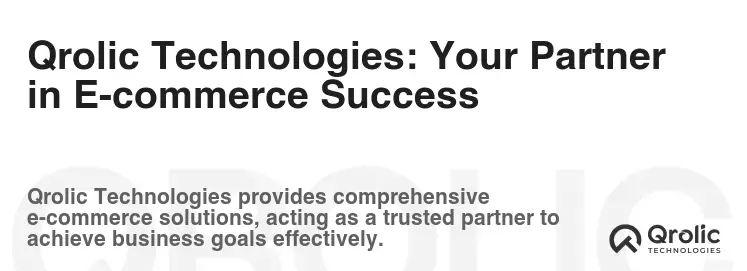
Choosing the right e-commerce platform is only the first step. To truly unlock your business’s potential, you need a reliable partner to provide expert guidance and support. That’s where Qrolic Technologies (https://qrolic.com/) comes in.
Qrolic Technologies is a leading e-commerce development agency with extensive experience in both BigCommerce and Magento (Adobe Commerce). We offer a comprehensive range of services to help you succeed online, including:
- E-commerce Consulting: We’ll help you choose the right platform for your business and develop a customized strategy to achieve your goals.
- Website Design and Development: We’ll create a visually appealing and user-friendly website that converts visitors into customers.
- Customization and Integration: We’ll customize your e-commerce platform to meet your specific needs and integrate it with your existing systems.
- SEO and Digital Marketing: We’ll optimize your website for search engines and develop a comprehensive digital marketing strategy to drive traffic and sales.
- Migration Services: We’ll help you migrate your data and website to BigCommerce or Magento seamlessly.
- Ongoing Support and Maintenance: We’ll provide ongoing support and maintenance to ensure your e-commerce platform runs smoothly and securely.
Why Choose Qrolic Technologies?
- Expertise: Our team of experienced developers and e-commerce specialists has a deep understanding of BigCommerce and Magento.
- Customized Solutions: We tailor our solutions to meet your specific needs and goals.
- Results-Driven Approach: We’re focused on delivering measurable results that improve your bottom line.
- Excellent Customer Service: We’re committed to providing exceptional customer service and support.
- Affordable Pricing: We offer competitive pricing without compromising on quality.
Whether you’re just starting out or looking to scale your existing e-commerce business, Qrolic Technologies can help you achieve your goals. Contact us today (https://qrolic.com/) to learn more about our services and how we can help you succeed online. Let us be your partner in building a thriving e-commerce empire.
Conclusion: Choosing the Right Path for Your E-commerce Journey
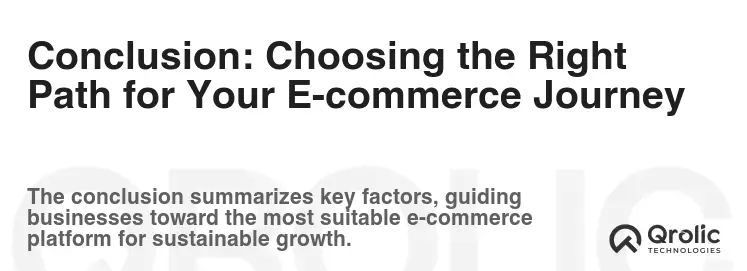
The decision between BigCommerce and Magento (Adobe Commerce) is a crucial one that can significantly impact the success of your e-commerce business. Both platforms offer powerful features and capabilities, but they cater to different needs and skillsets.
BigCommerce is an excellent choice for businesses that prioritize ease of use, scalability, and built-in features. Its SaaS architecture allows you to focus on selling products rather than managing technical infrastructure.
Magento (Adobe Commerce), on the other hand, is ideal for businesses that require a highly customizable and scalable solution with advanced SEO features and control. However, it requires more technical expertise and may be more expensive to implement and maintain.
Ultimately, the best enterprise e-commerce platform for you depends on your specific needs, budget, and technical capabilities. Carefully consider the factors outlined in this guide and choose the platform that aligns best with your long-term goals. And remember, Qrolic Technologies (https://qrolic.com/) is here to help you navigate the complexities of e-commerce and achieve your online success. Good luck on your e-commerce journey!
